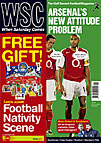 John Williams fondly recalls one of the games great characters
John Williams fondly recalls one of the games great characters
I last saw Emlyn Hughes in the summer of 2004. He was working for the Football Association on a fans’ roadshow in Manchester as part of the preparations for Euro 2004. Emlyn’s job was to leaven the necessary talk about train times, policing and fan embassies in Portugal with some humorous and stirring England football reminiscences. He didn’t disappoint. On wobbly legs and occasionally slowing in speech, Yosser offered both barbs and bouquets for current England players, while recalling his own past battles for Liverpool and England. He, deservedly, had the audience glazed in utter admiration. The physical and psychological signs of the illness that finally claimed him were clear then, but it was hard to know whether the old fighter was winning his battle or bravely carrying on regardless. Sadly, it proved to be the latter.
The teenage Hughes was recruited by Bill Shankly from Blackpool in March 1967. A natural enthusiast, the young Emlyn accidentally broke the leg of an opponent while Shankly scouted him – and never batted an eyelid. Shanks was suitably impressed. Hughes, initially, replaced the veteran Gerry Byrne at left-back, but he began the 1967-68 season in his favoured midfield slot. These were difficult, transition years at Anfield, culminating in an embarrassing FA Cup defeat at Watford in February 1970. Shankly promptly ditched the core of his 1960s team, led by Ron Yeats, and started to build a new one around his inspirational midfield leader, “Crazy Horse”.
The new side included Ray Clemence, Larry Lloyd, Kevin Keegan, John Toshack and Steve Heighway. In 1973, under Hughes’s inspirational driving and sparked by Keegan’s invention, Liverpool won the Championship and the UEFA Cup and, in 1974, carved up hapless Newcastle United in the FA Cup final.
Like his old club and country colleague Ray Kennedy, Hughes was both a fantastic player and a difficult man. Some of his playing partners complained that he was arrogant and that he identified too much with the management and not enough with the dressing-room foot soldiers. Tommy Smith famously blamed him for stealing his Liverpool captaincy by “sneaking” on him and other players to the bosses, Shankly and Bob Paisley. The two players barely spoke afterwards, even while sealing the Liverpool defence.
Under Paisley, Hughes moved into defence, becoming one of many Liverpool players at that time who were converted from playing higher up the pitch, a little Paisley secret. His mobility, comfort on the ball and his leadership in central defence, alongside the spindly Phil Thompson, were crucial as Liverpool adapted defensively to playing – and defeating – more cerebral continental opponents. Another title and UEFA Cup followed in 1976, before Hughes gloriously captained Liverpool to their first two European Cups, in 1977 and 1978.
Emlyn played only 16 times in the league in the record breaking 1978-79 Liverpool team – Alan Hansen and Alan Kennedy were now fixtures and Graeme Souness was the new midfield king; Hughes thought that Souness and Kenny Dalglish were the two world-class players he played with while at Liverpool. But he bullied Paisley into approving a swansong Reds appearance in an FA Cup semi-final against Manchester United in 1979: Liverpool lost and Hughes was rapidly sold on, to Wolves. When Liverpool players next travelled to Molineux and took part in a This is Your Life special recording for Hughes, they had to force TV grins: hours before, old Crazy Horse had typically willed his new club to a famous 1-0 win over the English champions.
Emlyn Hughes defined the very competitive heart of Liverpool FC in the 1970s in the way that Souness did after him and Steven Gerrard does today. But, off the field, he remained a hard man to love. In 2001 Emlyn sat directly behind me with a gaggle of female friends and hangers-on at the England v Finland World Cup qualifier at Anfield. He spent the entire game, Talksport style, slaughtering the England left-back, Charlton’s international rookie Chris Powell, and insisting that David Beckham was no “serious” England skipper.
Becks, inevitably, shone and scored the winner. Yosser loped away early. Even the greatest players, sadly, are not always great pundits.
From WSC 215 January 2005. What was happening this month